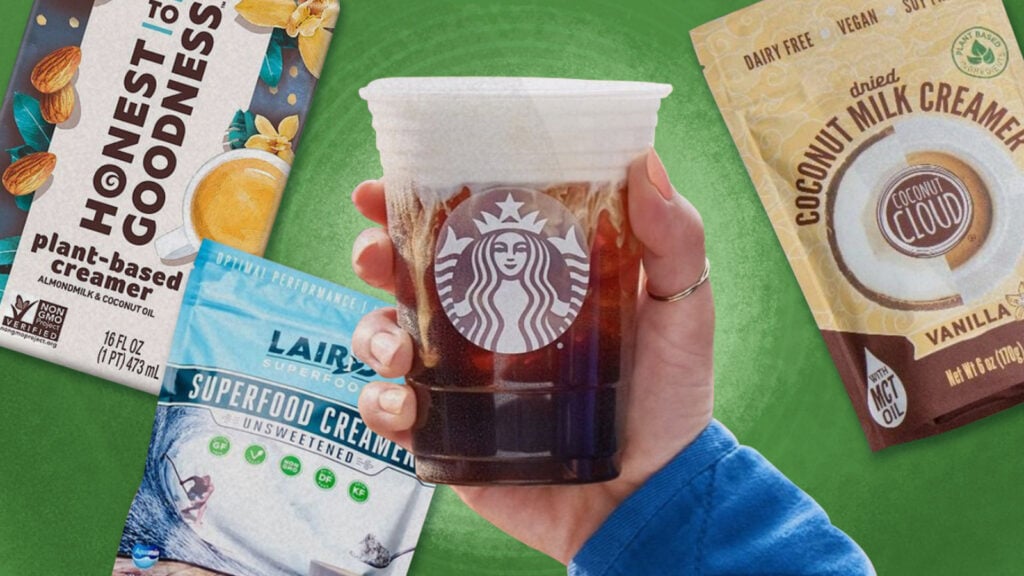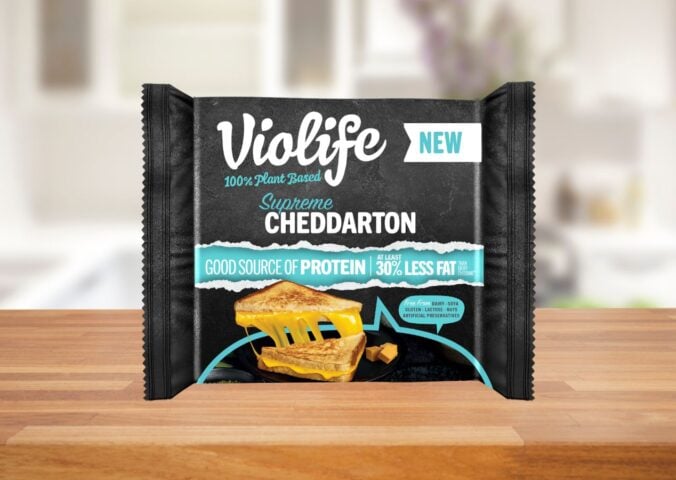For many people, days don’t start quite the same without a cup of coffee in the morning. Whether it’s from your local cafe, or percolated and poured into your favorite mug: it’s a ritual. The dairy-free oat milk generation may be here, but now a sweeter and creamier alternative is booming: non-dairy creamers.
The non-dairy creamer market is expected to be worth around $7 billion by 2025, according to the global agency Market and Research Biz.
But what are non-dairy creamers? Are they vegan, and are they healthy?
What is non-dairy creamer? Is it vegan?
Once known as tea or coffee whiteners, non-dairy creamers date back to the 1950s. When the products first surfaced they were designed to replace milk or cream, and offer a lactose-free option. Moreover, many brands focussed on make their creamers much lower in both calories and fat with a long shelf life.
And while lots of consumers infer dairy-free to mean plant-based (as is often the case), not all non-dairy creamers are vegan.
Typically, non-dairy creamers are comprised of corn syrup, vegetable oil, lecithin, sugars, and flavorings. They come in liquid or powder form.
The vegan versions often consist of far more nutrient-dense ingredients, like cacao, nuts, and coconut. Primary ingredients usually include a sweetener such as sucralose, or cane sugar.
In coconut-based creamers, for example, coconut milk is pressed and dried before it’s finely milled into a powder and added to other ingredients. Others include xantham gum, derived from sugar, which is used as a thickener.

Non-vegan ingredients to look out
Some non-dairy creamer brands still use animal-derived products such as casein, a protein found in cow’s milk. It’s commonly listed as sodium caseinate and used to achieve a white color.
One example is the early icon of non-dairy creamers: Coffee-Mate, owned by Nestlé. Other non-vegan ingredients include whey, also a byproduct of cow’s milk.
While the name might be misleading, creamers with milk derivates can still be branded non-dairy or dairy-free. This is because there currently isn’t a regulated definition for the terms under the Food and Drug Administration (FDA).
Other ingredients generally found in non-dairy creamers include lecithin, which is a fat found in both eggs and soybeans. However, if the lecithin is soy-based, it is often listed as such.
Is non-dairy creamer healthy?
Non-dairy creamers were invented to replace other dairy products, such as double cream which may lead to health problems including cancer and heart disease.
Additionally, for people intolerant or allergic to lactose, non-dairy creamers offer a way to liven up black coffee. This caters to a large proportion of the global population, disproportionately affecting Black, Indigenous, and people of color (BIPOC) communities. According to the National Institutes of Health, 95 percent of Asians cannot digest dairy, alongside 60-80 percent of Black people, 80 to 100 percent of Native Americans, and 50-80 percent of Latinx populations.
However, non-dairy creamers can be a energy-dense, nutrient-poor food, as many contain added sugars. For example, the fructose-rich corn syrup often included in non-dairy creamers may lead to increased blood pressure, or in severe cases, type 2 diabetes.
Other non-dairy creamers contain sugar-free sweetener, also called stevia. But artificial sweeteners come with potential health risks of their own.
Are artificial sweeteners good for you?
Lots of scientific studies have conflicting outcomes on whether non-sugar sweeteners (NSS) commonly used in non-dairy creamers are beneficial over simple sugars, such as fructose and glucose found in fruits.
A small list of non-sugar sweeteners have been approved by the FDA, while others are currently declared unsafe.
Artificial sweeteners are generally sweeter than sugar but contain fewer calories. As such, some people searching for foods with a lower calorie count opt for artificially sweetened coffee creamers. But that approach may not have merit.
A controlled study published in the peer-reviewed British Medical Journal in 2019 assessed the health implications of sugar-free sweetener versus simple sugar consumption. The authors found no “significant” differences in body weight. Moreover, both self-reported energy levels and the risk of developing various forms of cancer were found to be similar.
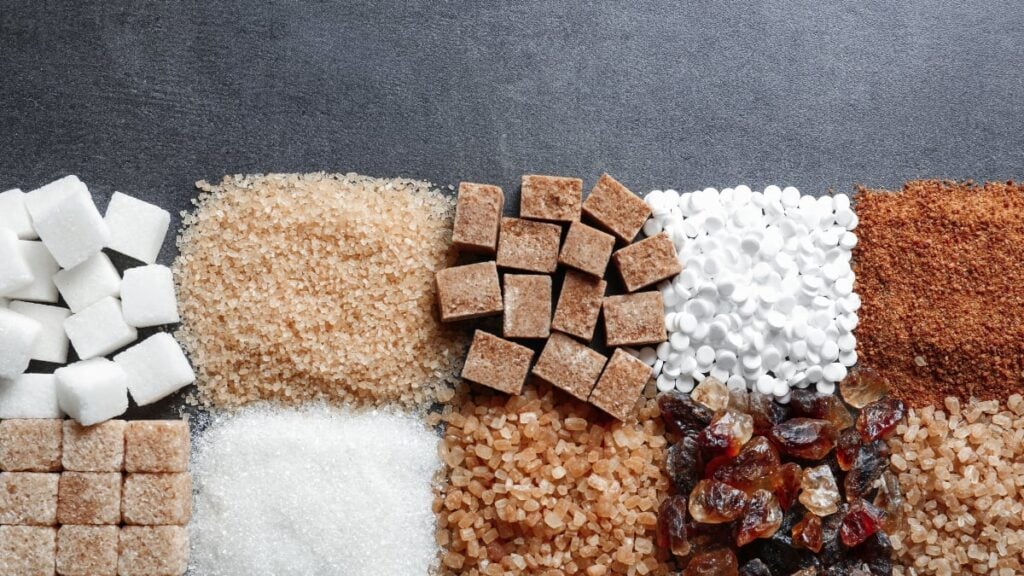
Vegan non-dairy creamer ingredients
Not all plant-based non-dairy creamers contain artificial sweeteners.
For example, Laird Superfood offers a range of Superfood Creamers made with mushroom, cacao, or turmeric.
In a statement sent to Plant Based News, the company said: “Many foods are way over-processed, and highly manipulated to take the important natural balance out of the foods that are critical for our bodies to recognize and process them properly.
“You want minimally processed, or whole food plant-based products to truly make the difference.”
The 11 best vegan non-dairy creamers
Here are our top 11 non-dairy creamers that are dairy-free and vegan-friendly.
1. Laird Superfood
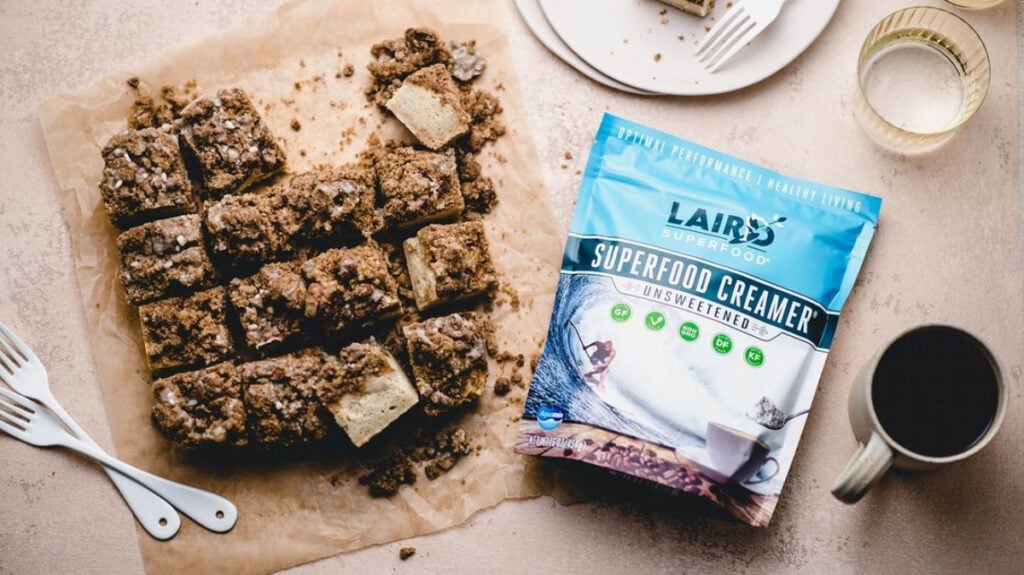
For its added nutritional benefits, Laird Superfood is a leader in vegan non-dairy creamers.
The brand’s creamers are said to be made with all-natural, GMO-free ingredients, including coconut milk, and extracts from chaga and maitake mushrooms.
You can buy the company’s vegan Original Superfood Creamer right here. It also sells unsweetened versions, as well as vegan-friendly ground mushroom coffee.
2. The Skinny Food Co.
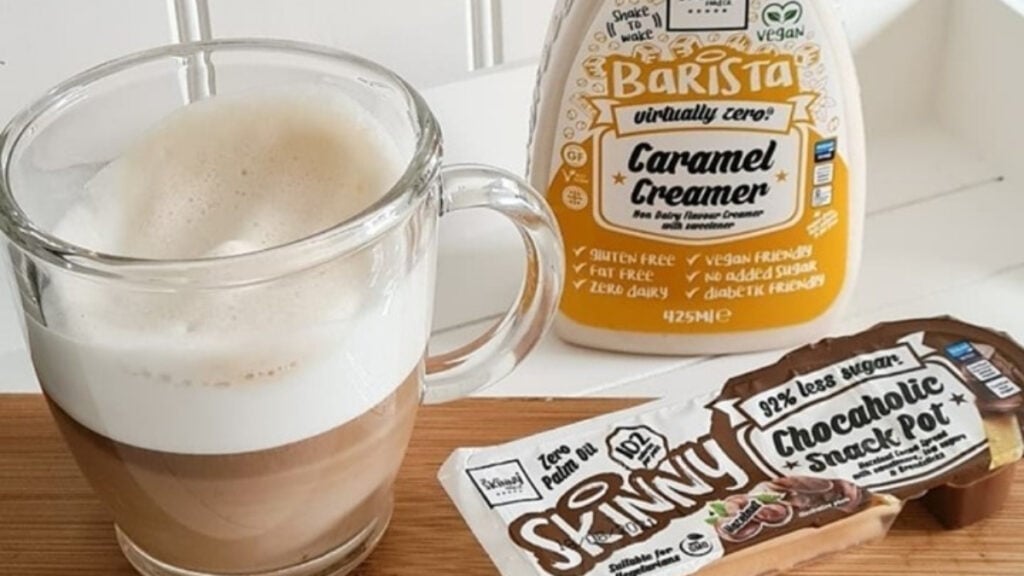
The Skinny Food Co. offers vegan barista-style non-dairy creamers in various flavors. Moreover, it claims to be free from fat, sugar, and gluten, as well as diabetic-friendly.
You can check out Skinny Food Co.’s creamers online, including its plant-based Hazelnut and Vanilla flavors.
3. Milkadamia
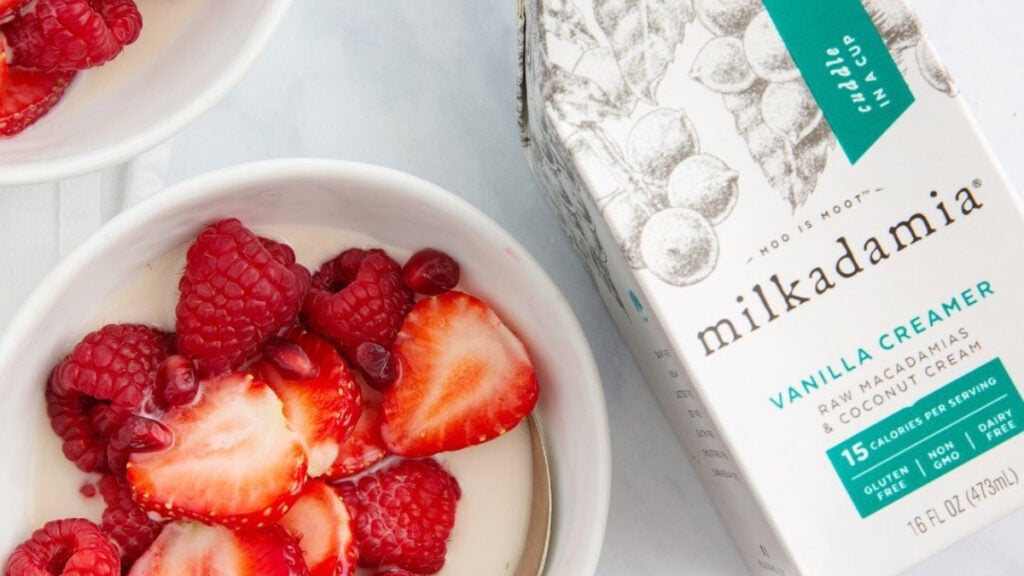
These non-dairy creamers promise “billowing clouds” of smooth creaminess. The prime ingredients are macadamia milk, sunflower oil, and coconut cream.
Flavors include Vanilla, Unsweetened Vanilla, Cinnamon, and Chai. You can find Milkadamia’s products at select Aldi and Walmart stores, among others.
4. Coconut Cloud
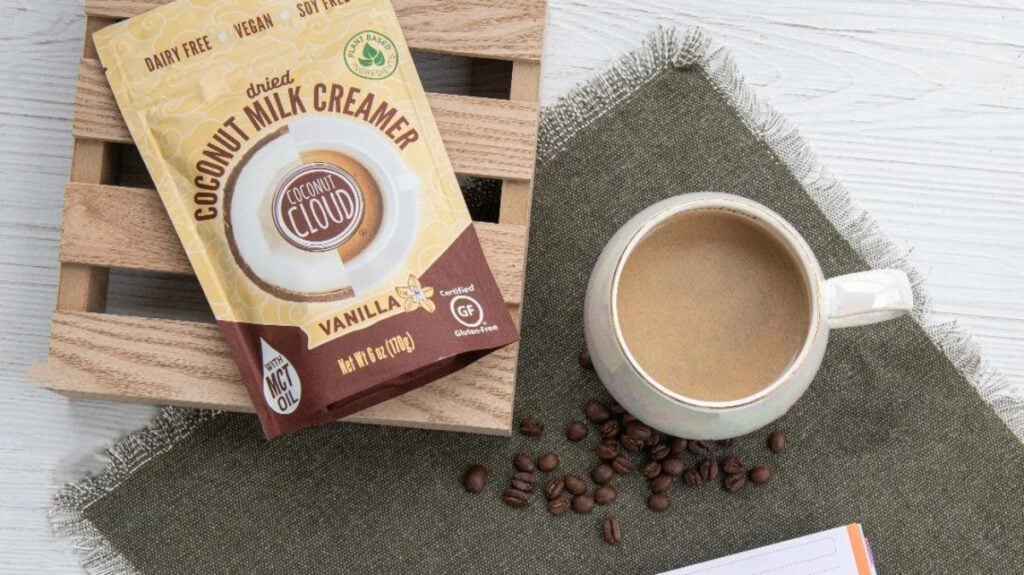
Creamers by Coconut Cloud contain natural flavorings and powdered coconut cream.
The brand, launched in 2016, offers an extensive range of vegan coffee creamer products, including Vanilla Coconut, Pumpkin Spice, Vanilla Coffee, and creamer sticks.
Additionally, it can be used as an alternative to coconut milk in recipes.
You can shop Coconut Cloud’s non-dairy creamers here.
5. NutPods
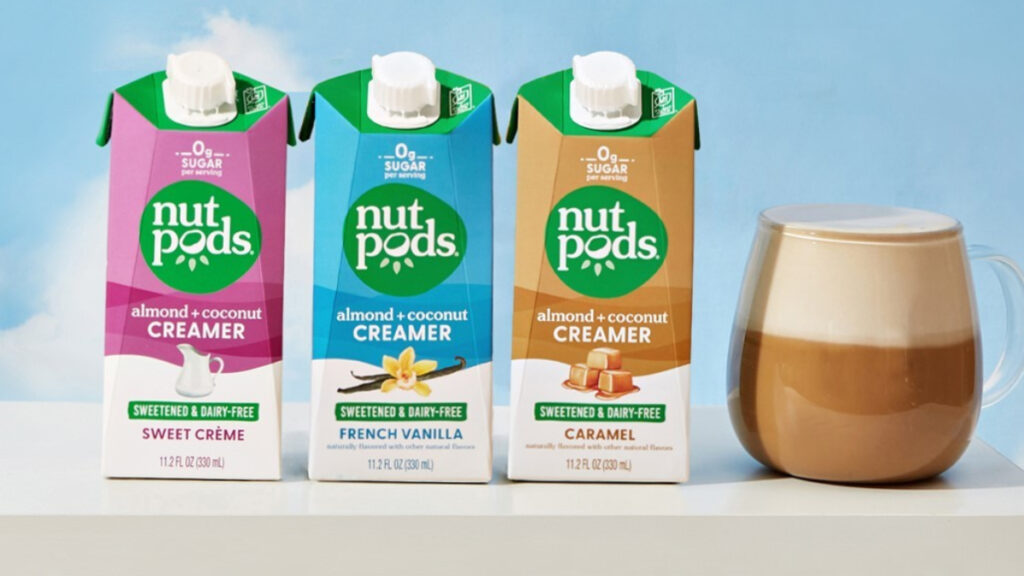
NutPods, which snagged Amazon’s Small Business of the Year Award in 2019, offers coffee-lovers a unique selection of vegan creamer flavors. Coffee Cake, Toasted Marshmallow, Cookie Butter, Cotton Candy, and Oat Cinnamon Swirl are just a handful of examples.
You can view NutPods’ non-dairy and vegan-friendly creamers here.
6. Honest To Goodness
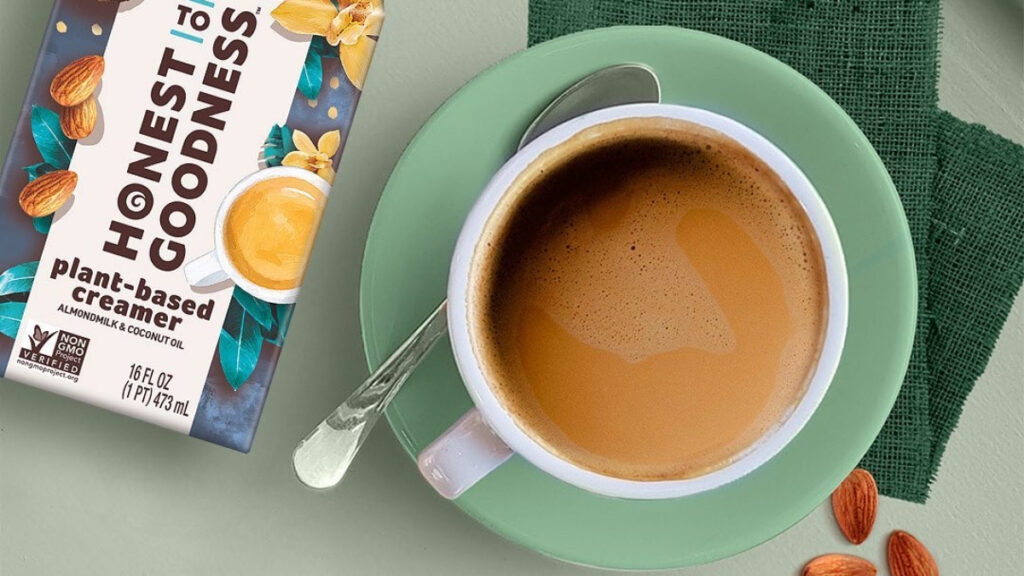
Honest To Goodness uses “thoughtfully sourced” ingredients from around the world.
They make up the Himalayan Salted Caramel and Madagascan Vanilla Bean flavors, sweetened by organic cane sugar and natural flavors.
You can shop the variety pack online here.
7. Califia Farms
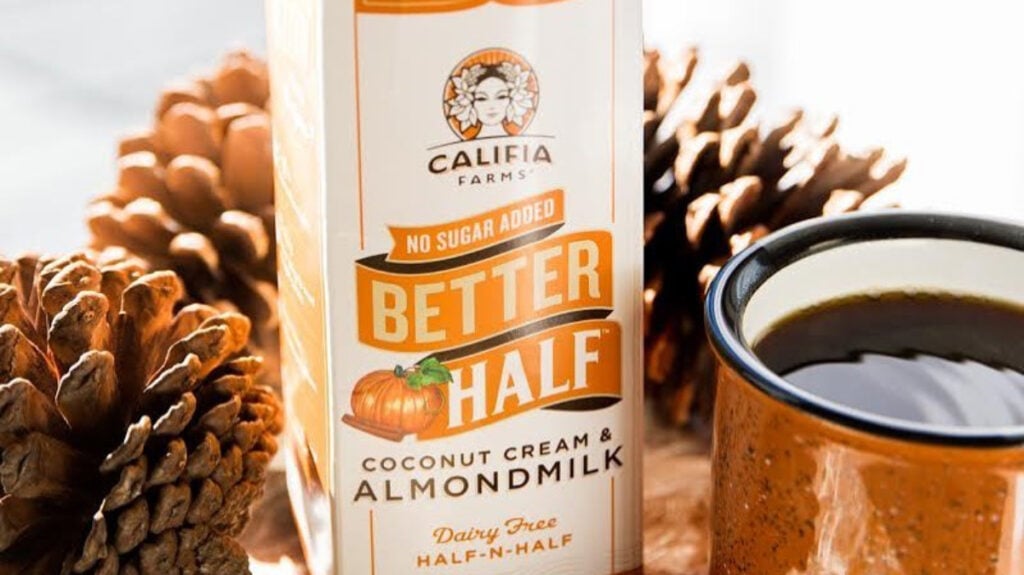
Better Half by Califia Farms is a creamy combination of coconut and almond, and is free from artificial sweeteners. With products like Caramel Macchiato Almond Creamer (which Better Half describes as “luscious”), the brand’s offerings work with both hot and iced coffee.
You can shop Better Half’s plant-based creamers here.
8. Starbucks
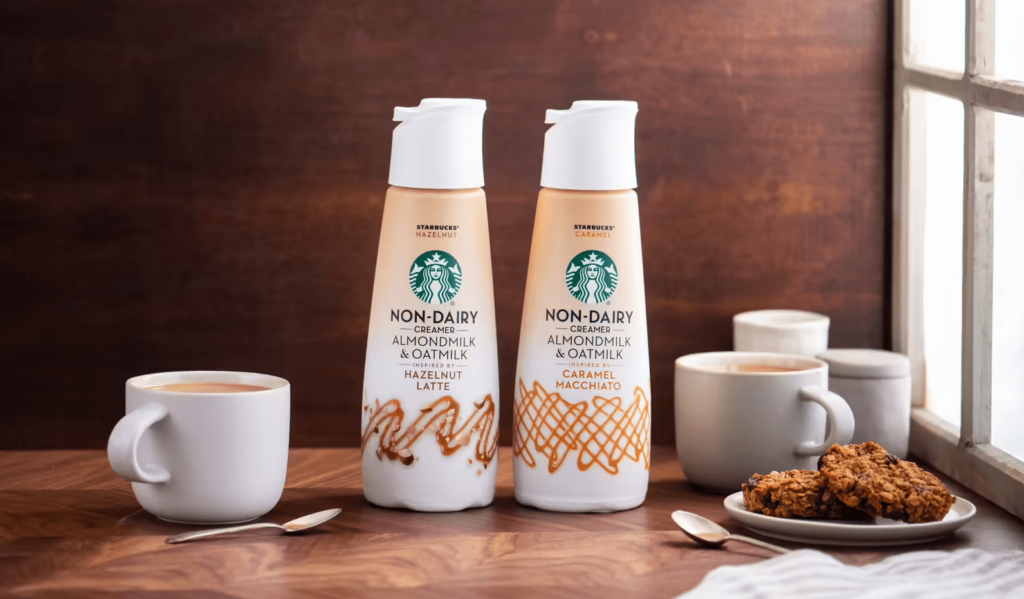
Coffee giant Starbucks unveiled its own range of coffee creamers. However, they’re not all vegan-friendly.
The plant-based options, made with almond and oat milk, include Non-Dairy Caramel, and Non-Dairy Hazelnut.
You can buy Starbucks’ creamer here, as well as many major supermarkets.
9. Silk
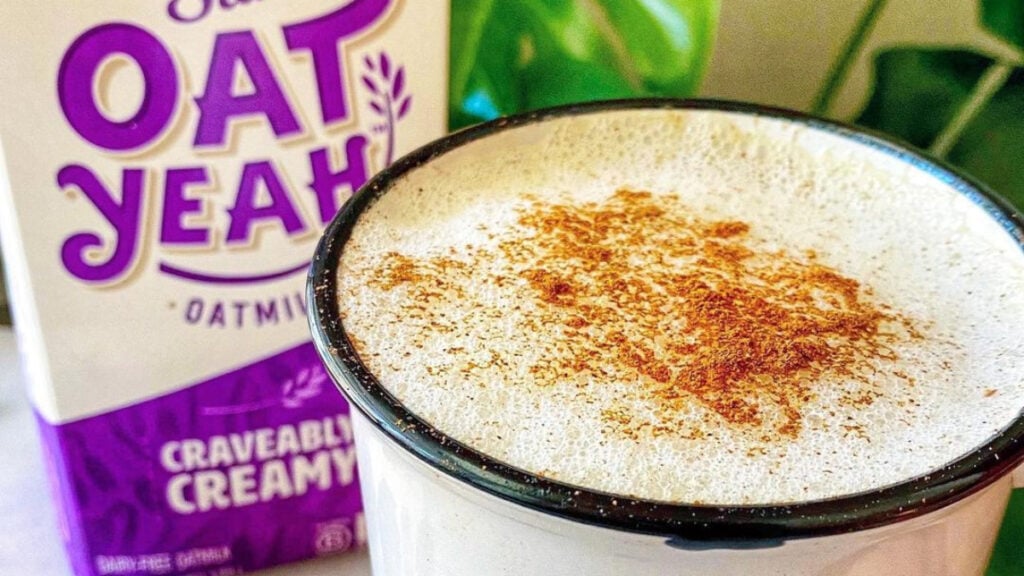
Danone-owned vegan dairy brand Silk offers a few different creamers, made from almond, oat, and soy milk. There are a host of flavors on offer across each category, including Toasted Hazelnut (almond), Pumpkin Spice (almond), Vanilla (soy), and Maple Brown Sugar (oat).
Silk also offers an ultra-creamy, vegan-friendly Half & Half option, made from oat and coconut milk.
You can locate Silk stockists here.
10. Unicreamer
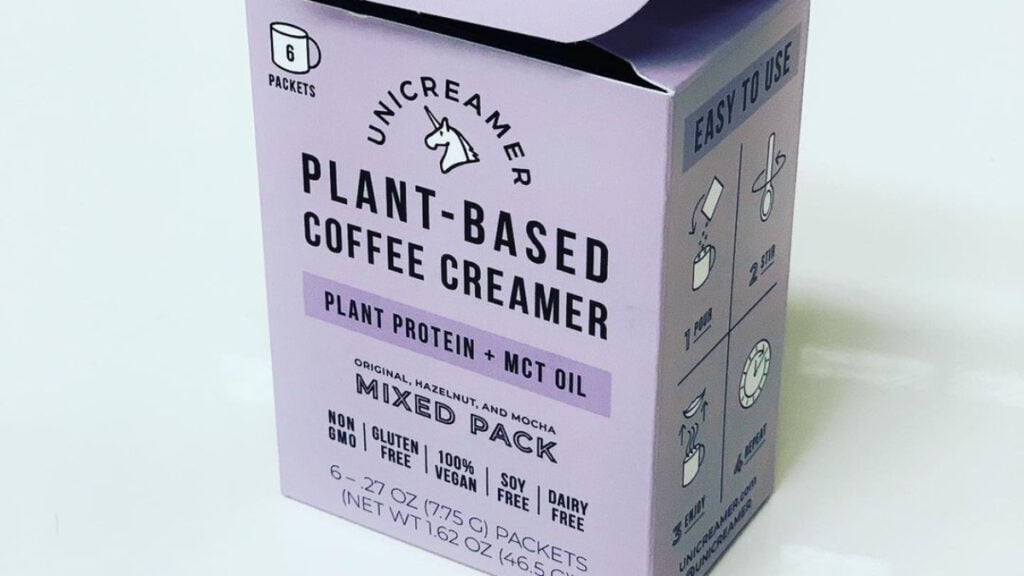
Vegan brand Unicreamer has a small (non-GMO) ingredient list of pea protein, coconut-derived MCT oil, and sunflower lecithin. It comes in on-the-go packets and is available in flavors like Hazelnut, Mocha, and Unsweetened.
You can shop Unicreamer here.
11. MALK
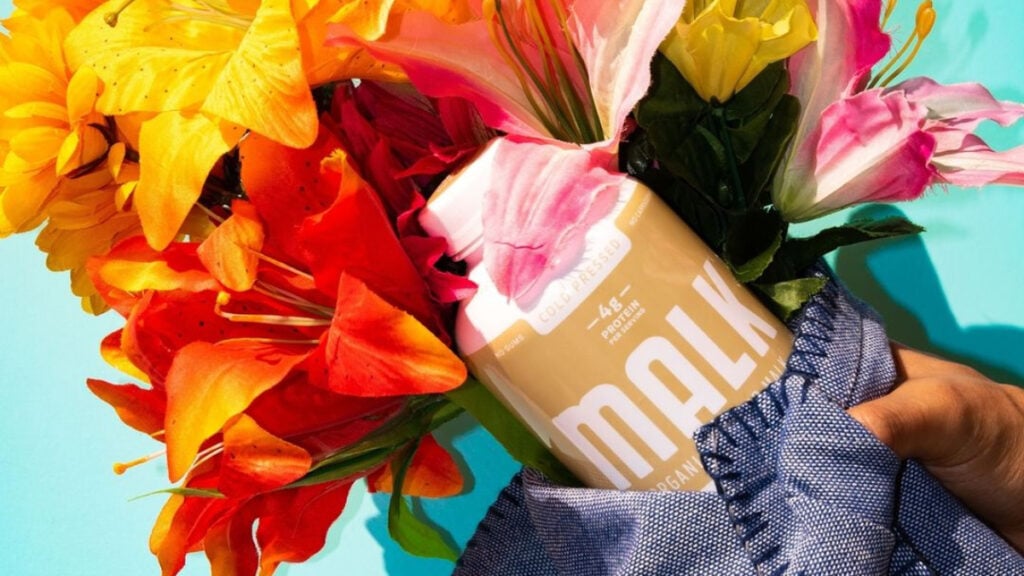
Creamers from MALK come in Unsweetened Oat and Almond, and Maple Oat + Pecan. Ingredients include organic oats and flaxseeds, which are loaded with omega-3 fatty acids.
You can find a store near you that sells MALK here.
—
If you purchase something through a link on our site, Plant Based News may earn a commission, which helps us to provide our free services to millions of people each week.
This article was originally published on June 20, 2021. It was last updated on May 19, 2023.
